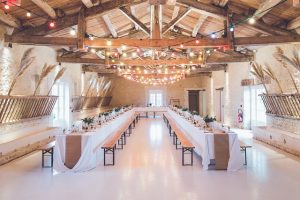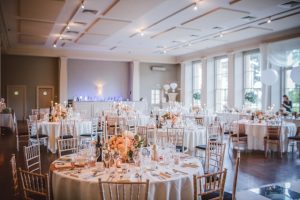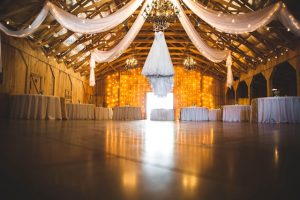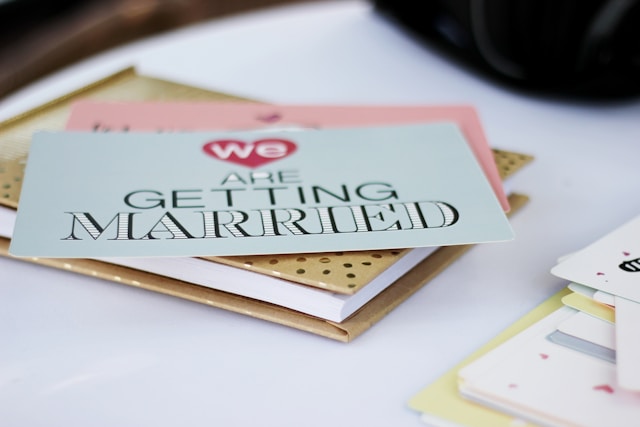Planning your own wedding can be an incredibly rewarding experience, but it also comes with its fair share of challenges and decisions to make.
From choosing the perfect venue to selecting the right vendors and managing a budget, there’s a lot to consider.
However, with careful planning and organisation, you can create the wedding of your dreams without the stress.
Get comfy, grab a drink and relax as we walk you through the essential steps to plan your own wedding, ensuring that every detail is taken care of to make your special day unforgettable.

Set Your Budget:

Creating a budget for your own wedding is a crucial step to ensure that you stay financially organised and can afford the wedding of your dreams without overspending.
Here’s a comprehensive list of things to consider when creating a budget for your wedding:
- Overall Budget: Determine the total amount of money you can allocate to your wedding. Consider your financial situation, savings, contributions from family members, and any loans or financial assistance you may have.
- Prioritise Spending: Decide which aspects of your wedding are most important to you and your partner. Allocate a larger portion of your budget to these priorities while being prepared to compromise on less critical elements.
- Venue Costs: The venue typically consumes a significant portion of the wedding budget. Consider rental fees, deposits, and any additional costs for ceremony and reception spaces, as well as any required catering minimums.
- Catering and Bar Expenses: Estimate the cost per person for catering services, including appetisers, main course, beverages, and desserts. Factor in any additional fees for service, gratuity, and bar packages or corkage fees if you plan to bring your own alcohol.
- Attire and Accessories: Budget for wedding attire, including the bride’s dress, groom’s suit, bridal party attire, shoes, accessories, and alterations. Don’t forget about attire for pre-wedding events like engagement parties and rehearsal dinners.
- Photography and Videography: Allocate funds for professional photographers and videographers to capture your special day. Consider packages, hourly rates, prints, albums, and additional services such as engagement shoots or drone footage.
- Entertainment: Budget for entertainment services such as DJs, live bands, musicians, or other performers for your ceremony, cocktail hour, and reception. Factor in equipment rentals, sound systems, and any special requests or song selections.
- Floral and Decor: Estimate the cost of floral arrangements, bouquets, boutonnieres, centrepieces, ceremony decor, and reception decorations. Consider the seasonality of flowers and any additional fees for setup, delivery, or rental items like linens and lighting.
- Stationery and Invitations: Budget for save-the-dates, wedding invitations, RSVP cards, programs, menus, escort cards, thank-you notes, and postage. Consider design, printing, and assembly costs, as well as any additional fees for custom artwork or calligraphy.
- Wedding Rings: Set aside funds for wedding rings for both partners. Consider the type of metal, style, and any customization or engraving options you desire.
- Transportation: Budget for transportation services for you, your partner, and your guests, including limousines, shuttles, or car rentals. Consider transportation to and from the ceremony and reception venues, as well as any accommodations for out-of-town guests.
- Wedding Planner/Coordinator: If you’re hiring a wedding planner or coordinator, factor in their fees for full-service planning, partial planning, day-of coordination, or hourly consultations.
- Miscellaneous Expenses: Set aside a contingency fund for unexpected costs or last-minute expenses that may arise during the planning process. Consider fees for marriage licences, permits, insurance, gratuities, or any additional services or upgrades you may want.
- Post-Wedding Expenses: Remember to budget for post-wedding expenses such as cleaning fees, gown preservation, vendor tips, and any outstanding payments or invoices.
- Honeymoon: If you plan to go on a honeymoon after the wedding, allocate funds for travel, accommodations, activities, meals, and any additional expenses associated with your honeymoon destination.
By carefully considering each of these factors and creating a detailed budget breakdown, you can plan your wedding expenses effectively and ensure that you stay within your financial means while creating the wedding of your dreams.
Choose Your Wedding Style and Theme:

Choosing the right wedding style and theme sets the tone for your special day and reflects your personalities and preferences as a couple.
Here’s a comprehensive list of things to consider when selecting your wedding style and theme:
- Personal Preferences: Reflect on your personal tastes, interests, and lifestyle as a couple. Consider whether you prefer a traditional, modern, vintage, rustic, romantic, bohemian, or eclectic style.
- Seasonality: Take into account the season in which you’ll be getting married. Consider colours, textures, and decor elements that are appropriate for the time of year, whether it’s spring, summer, fall, or winter.
- Venue Compatibility: Choose a wedding style and theme that complements the aesthetic and ambiance of your chosen venue. Whether you’re getting married in a ballroom, garden, barn, beach, vineyard, or historic mansion, ensure that your theme enhances the venue’s natural beauty and surroundings.
- Colour Palette: Select a colour palette that reflects your wedding style and theme. Consider colours that resonate with your personalities and evoke the mood you want to create, whether it’s soft pastels, bold and vibrant hues, or timeless neutrals.
- Inspiration and Vision: Gather inspiration from wedding blogs, magazines, social media platforms like Pinterest, and real weddings to help clarify your vision. Create mood boards for Pinterest boards to collect ideas and images that inspire you.
- Cultural and Religious Traditions: Incorporate cultural or religious traditions that are meaningful to you and your families into your wedding style and theme. Whether it’s a traditional ceremony, rituals, or customs, infuse these elements into your overall wedding design.
- Budget Considerations: Consider the cost implications of your chosen wedding style and theme. Some themes may require more elaborate decor, rentals, or customization, while others may be more budget-friendly or DIY-friendly.
- Coordination with Attire: Ensure that your chosen wedding style and theme coordinate with your attire and the attire of your bridal party. Select dresses, suits, accessories, and hairstyles that complement the overall aesthetic and colour scheme.
- Consistency and Cohesion: Maintain consistency and cohesion throughout your wedding design by incorporating your chosen theme into every aspect of the wedding, from invitations and stationery to decor, florals, and signage.
- Guest Experience: Consider the guest experience when choosing your wedding style and theme. Create a cohesive and immersive environment that engages and delights your guests, from arrival to departure.
- Flexibility and Adaptability: Remain flexible and adaptable throughout the planning process. Be open to making adjustments and tweaks to your wedding style and theme as needed based on venue restrictions, budget constraints, and logistical considerations.
- Personalization: Infuse your wedding style and theme with personal touches and details that reflect your love story and relationship. Incorporate elements such as family heirlooms, photos, hobbies, or shared interests to make your wedding uniquely yours.
- Consultation with Vendors: Collaborate with your wedding vendors, including florists, decorators, planners, and rental companies, to bring your vision to life. Seek their expertise and advice on how to execute your chosen style and theme effectively.
- Emotional Connection: Choose a wedding style and theme that resonates with you emotionally and feels authentic to who you are as a couple. Focus on creating a wedding that reflects your love, values, and shared dreams for the future.
By considering these key factors, you can confidently choose the perfect wedding style and theme that reflects your unique personality and creates a memorable and meaningful celebration of your love.
Select the Perfect Venue:

Selecting the perfect venue for your wedding is one of the most important decisions you’ll make during the planning process.
Here’s a comprehensive list of things to consider when choosing your wedding venue:
- Capacity and Guest Count: Determine the number of guests you plan to invite and ensure that the venue can accommodate your desired guest count comfortably. Consider both the ceremony and reception spaces if they are separate.
- Location: Choose a location that is convenient and accessible for you and your guests. Consider factors such as proximity to airports, hotels, transportation hubs, and local attractions. Also, think about the overall vibe of the location, whether it’s urban, rural, coastal, or mountainous.
- Aesthetic and Atmosphere: Consider the aesthetic and atmosphere of the venue and whether it aligns with your wedding style and theme. Evaluate the architecture, landscaping, decor, and overall ambiance to ensure it matches your vision for your special day.
- Venue Type: Decide on the type of venue that suits your preferences and needs. Options may include hotels, banquet halls, country clubs, historic estates, barns, gardens, beaches, vineyards, or industrial lofts. Each venue type offers its own unique charm and amenities.
- Availability and Flexibility: Check the availability of your preferred dates and inquire about any restrictions or limitations imposed by the venue. Consider whether the venue offers exclusive use or shared access with other events, as well as flexibility in terms of setup, timing, and vendor choices.
- Cost and Budget: Determine the cost of renting the venue and whether it fits within your overall wedding budget. Inquire about pricing for peak and off-peak seasons, as well as any additional fees or minimum spending requirements. Be sure to factor in costs for ceremony fees, catering, rentals, and other services.
- Services and Amenities: Evaluate the services and amenities offered by the venue, such as catering, event coordination, audiovisual equipment, furniture, linens, and parking. Determine whether the venue provides in-house services or allows outside vendors.
- Ceremony and Reception Spaces: Assess the suitability of the venue for both your ceremony and reception. Consider the layout, flow, and logistics of each space, including seating arrangements, dance floor size, and accessibility for guests with mobility needs.
- Outdoor Options and Backup Plan: If you’re considering an outdoor venue, ensure that there’s a suitable backup plan in case of inclement weather. Inquire about indoor alternatives or tents that can be erected on-site to protect against rain or extreme temperatures.
- Venue Policies and Restrictions: Review the venue’s policies and restrictions regarding decor, alcohol service, noise levels, curfew, and any other rules that may impact your wedding plans. Clarify any questions or concerns with the venue coordinator before signing a contract.
- Vendor Relationships: Inquire about the venue’s preferred vendor list and any partnerships they have with local vendors. Determine whether you’re required to use specific vendors or if you have the flexibility to bring in your own team of professionals.
- Accessibility and Accommodations: Consider the accessibility of the venue for all guests, including those with disabilities or special needs. Inquire about parking facilities, restroom availability, and accommodations for elderly guests or families with young children.
- Personal Connection: Trust your instincts and consider whether you feel a personal connection to the venue. Visualise yourself exchanging vows and celebrating with loved ones in the space, and choose a venue that resonates with you emotionally.
- Reviews and Recommendations: Research online reviews and testimonials from past couples who have hosted weddings at the venue. Seek recommendations from friends, family, or wedding professionals who have experience with the venue.
- Site Visit and Inspection: Schedule a site visit to tour the venue in person and inspect the facilities firsthand. Take note of the layout, condition, cleanliness, and overall impression of the venue, and ask any questions that come to mind during the visit.
By carefully considering these factors and conducting thorough research, you can select the perfect venue that fulfils your vision and creates an unforgettable backdrop for your wedding celebration.
Create Your Guest List:

Creating the guest list for your wedding involves careful consideration and planning to ensure that you include the people who are most important to you and your partner while staying within your budget and venue capacity.
Here’s a comprehensive list of things to consider when selecting your wedding guest list:
- Immediate Family: Begin by listing immediate family members, including parents, siblings, and grandparents. These are the people closest to you and your partner who will undoubtedly be invited to your wedding.
- Extended Family: Consider extended family members such as aunts, uncles, cousins, and other relatives. Determine which relatives you have close relationships with and would like to include in your celebration.
- Close Friends: Include close friends who have been an important part of your lives and relationships. Consider friends from different stages of your life, such as childhood friends, college friends, work friends, and current friends.
- Mutual Friends: If you and your partner share mutual friends, discuss which of these friends you both want to invite to the wedding. Consider the strength of your relationships with these friends and whether they play a significant role in your lives as a couple.
- Work Colleagues: Decide whether you want to invite colleagues from your workplace or professional network. Consider the size of your workplace and the nature of your relationships with your coworkers when making this decision.
- Family Friends: Think about family friends who have been supportive and involved in your lives. Determine which family friends you want to invite based on the strength of your relationships and the capacity of your venue.
- Children and Plus-Ones: Decide whether you will invite children to your wedding and whether you will extend plus-one invitations to single guests. Consider your budget, venue capacity, and whether you want to create a more intimate or inclusive atmosphere.
- Geographical Considerations: If you have guests travelling from out of town, consider whether they will be able to attend based on their location, travel restrictions, and availability. Factor in the costs and logistics of accommodating out-of-town guests when finalising your guest list.
- Venue Capacity: Determine the maximum number of guests that your chosen venue can accommodate comfortably. Be mindful of any restrictions or limitations imposed by the venue and ensure that your guest list aligns with the venue’s capacity.
- Budget Considerations: Consider the cost implications of each additional guest on your budget, including catering, seating, and other expenses. Be realistic about your budget constraints and prioritise guests accordingly.
- Cultural and Religious Considerations: If you have cultural or religious traditions that dictate certain guest list criteria, be sure to incorporate these considerations into your decision-making process. Consult with family members or religious leaders as needed.
- Personal Preferences: Ultimately, your wedding guest list should reflect your personal preferences and priorities as a couple. Consider who you genuinely want to share your special day with and focus on creating a guest list that feels meaningful and authentic to you.
- Finalising the List: Once you’ve created a preliminary guest list, review it together with your partner and make any necessary adjustments or compromises. Consider factors such as overall guest count, balance between your respective families and friends, and any special circumstances or considerations.
- Communicate Clearly: Communicate your guest list decisions clearly and diplomatically with any individuals who may not be invited to the wedding. Be honest and transparent about the reasons for your decision and express your gratitude for their understanding and support.
- Maintain Flexibility: Remain flexible throughout the planning process and be prepared to make adjustments to your guest list as needed. Keep in mind that unexpected changes or circumstances may arise, and be willing to adapt accordingly to ensure that your wedding day is filled with joy and celebration.
Book Your Vendors:

Selecting the right vendors for your wedding is essential to ensuring that your special day runs smoothly and meets your expectations.
Here’s a comprehensive list of things to consider when choosing your wedding vendors:
- Research and Recommendations: Begin by researching wedding vendors in your area through online directories, wedding websites, social media platforms, and recommendations from friends, family, or other couples who have recently gotten married.
- Vendor Specialties: Determine the specific services you’ll need for your wedding, such as photography, videography, catering, florals, entertainment, planning, rentals, hair and makeup, transportation, and officiating. Look for vendors who specialise in your desired services and have experience with weddings similar to yours.
- Portfolio and Reviews: Review the portfolios, galleries, and testimonials of potential vendors to assess the quality of their work and the satisfaction of their past clients. Look for consistency, creativity, and positive feedback from couples who have worked with them.
- Availability: Check the availability of your preferred vendors for your wedding date. Some popular vendors may book up quickly, especially during peak wedding season, so it’s essential to inquire about their availability as soon as possible.
- Budget Compatibility: Consider the pricing and packages offered by each vendor and determine whether they fit within your wedding budget. Inquire about pricing structures, payment schedules, and any additional fees or charges to ensure that you can afford their services.
- Communication and Responsiveness: Evaluate the vendor’s communication style and responsiveness to inquiries, emails, and phone calls. Choose vendors who are professional, attentive, and easy to reach throughout the planning process.
- Personality Match: Schedule consultations or meetings with potential vendors to get to know them personally and assess whether you have a good rapport with them. Choose vendors who understand your vision, listen to your ideas, and are receptive to your input.
- Professionalism and Experience: Consider the level of professionalism and experience demonstrated by each vendor. Inquire about their years of experience, qualifications, training, and any industry awards or certifications they may have.
- References and Referrals: Request references from past clients or ask vendors for referrals from other wedding professionals they’ve worked with. Contact these references to get firsthand feedback on their experience working with the vendor and the quality of their services.
- Contract and Terms: Review the vendor contracts carefully and ensure that all terms, conditions, and expectations are clearly outlined. Pay attention to details such as payment deadlines, cancellation policies, liability clauses, and any specific requirements or restrictions.
- Flexibility and Customization: Inquire about the vendor’s flexibility and willingness to customise their services to meet your specific needs and preferences. Discuss any special requests, themes, or unique elements you want to incorporate into your wedding.
- Insurance and Licences: Verify that the vendor has appropriate insurance coverage and any necessary licences or permits required to operate legally in your area. This ensures that you’re protected in the event of unforeseen circumstances or accidents.
- Tastings and Trials: If applicable, schedule tastings or trials with food, cake, floral arrangements, hair, and makeup to sample the vendor’s offerings and ensure they meet your expectations in terms of quality, presentation, and taste.
- Backup Plans and Contingencies: Inquire about the vendor’s backup plans and contingencies for emergencies, equipment failures, or unforeseen circumstances that may arise on your wedding day. Ensure that they have a plan in place to address any potential issues promptly and effectively.
- Trust Your Instincts: Trust your instincts and intuition when choosing your wedding vendors. Select vendors who make you feel confident, comfortable, and excited about working with them to bring your wedding vision to life.
By considering these factors and conducting thorough research and consultations, you can confidently choose the right vendors who will contribute to the success and beauty of your wedding day.
Plan Your Ceremony and Reception:

Planning your ceremony and reception requires attention to detail and careful coordination to ensure that every aspect of your wedding day runs smoothly and reflects your vision.
Here’s a comprehensive list of things to consider when planning your ceremony and reception:
- Venue Selection: Choose separate venues for your ceremony and reception, or opt for a venue that can accommodate both. Consider factors such as location, capacity, ambiance, and amenities when selecting venues.
- Ceremony Details: Determine the type of ceremony you want (secular, religious, traditional, non-traditional, etc.). Select readings, vows, music, and rituals that are meaningful to you and your partner. Coordinate with your officiant to personalise the ceremony and incorporate any cultural or religious traditions.
- Seating Arrangements: Plan seating arrangements for the ceremony, ensuring that guests have a clear view of the proceedings. Consider reserved seating for immediate family members, bridal party members, and VIP guests.
- Ceremony Decor: Choose decor elements such as floral arrangements, aisle runners, arches, chuppahs, or other decorative accents. Coordinate decor with your wedding style and theme, keeping the focus on the ceremony space.
- Reception Timeline: Create a detailed timeline for the reception, including arrival times, cocktail hour, dinner service, toasts, cake cutting, and dancing. Work with your vendors to ensure that the timeline is realistic and allows for smooth transitions between activities.
- Seating Chart: Design a seating chart or layout for the reception, taking into account guest preferences, relationships, and any special accommodations. Consider using escort cards, place cards, or a seating chart display to guide guests to their assigned tables.
- Reception Layout: Plan the layout of the reception space, including table arrangements, dance floor placement, and any additional areas for entertainment or activities. Consider the flow of traffic and accessibility for guests, ensuring that the layout encourages interaction and mingling.
- Menu Selection: Choose a menu that reflects your tastes, dietary preferences, and budget. Consider options for appetisers, entrees, desserts, and beverages, including alcoholic and non-alcoholic choices. Accommodate any special dietary restrictions or allergies among your guests.
- Beverage Service: Decide on the bar setup and beverage options for the reception, including beer, wine, cocktails, and non-alcoholic beverages. Determine whether you’ll offer an open bar, limited bar, or cash bar, and establish guidelines for responsible alcohol consumption.
- Entertainment: Book entertainment for the reception, such as a DJ, band, solo musician, or other performers. Create a playlist of songs for key moments like the first dance, parent dances, and bouquet toss, as well as background music for dinner and dancing.
- Speeches and Toasts: Coordinate with your emcee, wedding party members, and family members to plan speeches and toasts during the reception. Provide guidelines and time limits for speakers to ensure that toasts are heartfelt, concise, and appropriate for the occasion.
- Decor and Centerpieces: Select decor elements for the reception space, including centrepieces, table linens, chair covers, and lighting. Consider incorporating personal touches, such as photos, candles, or memorabilia, to enhance the decor and create a personalised atmosphere.
- Cake and Dessert Display: Choose a wedding cake or dessert options that complement your theme and taste preferences. Decide on the cake design, flavours, and presentation, as well as any additional dessert options such as cupcakes, dessert bars, or candy stations.
- Photography and Videography: Coordinate with your photographer and videographer to capture key moments throughout the ceremony and reception. Provide a shot list of must-have photos and videos, including family portraits, group shots, and candid moments.
- Guest Experience: Consider the overall guest experience and ensure that guests feel welcomed, comfortable, and entertained throughout the ceremony and reception. Provide amenities such as restroom facilities, coat check services, and transportation options for guests who may need assistance.
By considering these factors and planning ahead, you can create a memorable and seamless ceremony and reception that reflects your love story and celebrates your union with family and friends.
Choose Your Attire and Accessories:

Choosing the perfect attire and accessories for your wedding is an exciting part of the planning process.
Here’s a comprehensive list of things to consider when selecting your wedding attire and accessories:
- Personal Style: Consider your personal style preferences and how you want to look and feel on your wedding day. Decide whether you prefer a traditional, modern, vintage, bohemian, or eclectic aesthetic.
- Wedding Theme: Choose attire and accessories that complement the overall theme and vibe of your wedding. Ensure that your outfit aligns with the formality, seasonality, and location of the event.
- Bridal Gown: Select a wedding dress that makes you feel confident, beautiful, and comfortable. Consider factors such as silhouette, neckline, fabric, embellishments, and train length. Schedule fittings and alterations to ensure a perfect fit.
- Groom’s Attire: Choose a suit or tuxedo that reflects your personal style and complements the bride’s attire. Consider factors such as colour, fit, fabric, lapel style, and accessories like ties, bow ties, vests, and pocket squares.
- Bridal Party Attire: Coordinate attire for the bridal party, including bridesmaids, groomsmen, flower girls, and ring bearers. Select dresses or suits that complement the overall color scheme and theme of the wedding.
- Accessories: Choose accessories to enhance your wedding attire and add personal touches. Consider items such as veils, headpieces, hair accessories, jewellery, belts, sashes, gloves, and wraps. Coordinate accessories with your dress style and neckline.
- Shoes: Select comfortable yet stylish shoes that complement your wedding attire and suit the venue and season. Consider factors such as heel height, material, colour, and embellishments. Break in your shoes before the wedding day to avoid discomfort.
- Undergarments: Choose supportive and comfortable undergarments that provide the right foundation for your wedding attire. Consider options such as bras, shapewear, slips, and lingerie that complement your dress silhouette.
- Hair and Makeup: Schedule hair and makeup trials to experiment with different styles and looks before the wedding day. Consider factors such as hair length, texture, and accessories, as well as makeup colours, techniques, and finishes.
- Grooming and Skincare: Plan grooming and skincare routines leading up to the wedding to ensure that you look and feel your best. Schedule haircuts, beard trims, facials, and other treatments to prepare for the big day.
- Cultural and Religious Considerations: If you have cultural or religious traditions that dictate attire requirements, ensure that your wedding attire adheres to these guidelines. Consult with family members or religious leaders as needed.
- Comfort and Mobility: Choose wedding attire and accessories that allow you to move comfortably and freely throughout the day. Consider factors such as fabric breathability, weight, and flexibility to ensure ease of movement.
- Weather Considerations: Take into account the weather conditions on your wedding day and choose attire and accessories accordingly. Consider options for layering, warmth, and protection from sun, wind, or rain.
- Backup Options: Have backup attire options available in case of any last-minute emergencies or wardrobe malfunctions. Pack a bridal emergency kit with essentials like safety pins, stain remover, sewing kit, and spare accessories.
- Sentimental Value: Consider incorporating sentimental or heirloom pieces into your wedding attire and accessories. Choose items that hold special meaning or significance to you and your family, such as heirloom jewellery, vintage accessories, or handmade items.
By considering these factors and taking the time to select the perfect attire and accessories, you can create a stunning and cohesive wedding day look that reflects your style, personality, and love story.
Plan Your Decor and Details:

Planning the decor and details for your wedding is an opportunity to infuse your personality and style into every aspect of your celebration.
Here’s a comprehensive list of things to consider when planning your wedding decor and details:
- Overall Theme and Style: Determine the overall theme and style for your wedding, whether it’s rustic, romantic, modern, vintage, bohemian, or a combination of styles. Ensure that your decor choices reflect and enhance your chosen theme.
- Colour Palette: Choose a colour palette that compliments your wedding theme and reflects your personal taste. Consider incorporating two to three primary colours, as well as accent colours and neutrals for balance and contrast.
- Venue Atmosphere: Consider the ambiance and aesthetic of your venue when planning your decor. Enhance the existing features of the space with decor elements that complement its architecture, lighting, and surroundings.
- Ceremony Decor: Select decor elements for the ceremony space, such as floral arrangements, arches, aisle runners, and seating options. Consider incorporating personal touches, such as custom signage, unity ceremonies, or cultural and religious symbols.
- Reception Decor: Plan the decor for the reception space, including tablescapes, centrepieces, linens, chair covers, and lighting. Consider incorporating statement pieces, such as hanging installations, backdrops, or ceiling drapery, to create visual impact.
- Table Settings: Design table settings that reflect your wedding theme and colour palette. Choose table linens, napkins, chargers, flatware, glassware, and place settings that coordinate with your decor style. Consider incorporating personalised elements, such as custom menus, place cards, or favours, to add a personal touch to each table.
- Floral Design: Work with a florist to design floral arrangements that complement your wedding theme and color scheme. Consider options for bouquets, boutonnieres, corsages, centrepieces, ceremony decor, and reception accents. Choose flowers and greenery that are in season and readily available, and consider alternative options like silk or dried flowers for long-lasting decor.
- Signage and Stationery: Create signage and stationery that guide and inform your guests throughout the wedding day. Consider options for welcome signs, ceremony programs, seating charts, menu cards, and directional signs. Choose a cohesive design and typography that matches your wedding theme and colour palette, and incorporate personal details such as monograms, quotes, or illustrations.
- Lighting Design: Plan the lighting design for your wedding to enhance the mood and atmosphere of the venue. Consider options for ambient lighting, accent lighting, and special effects such as uplighting, string lights, candles, or lanterns. Work with a lighting designer or rental company to create a lighting scheme that complements your decor and highlights key areas of the venue.
- Specialty Rentals: Consider renting specialty decor items to enhance your wedding decor, such as furniture, arches, drapery, dance floors, or photo booths. Choose rental items that align with your wedding theme and style, and coordinate delivery, setup, and pickup logistics with the rental company.
- DIY and Personal Touches: Incorporate DIY projects and personal touches into your wedding decor to add a unique and meaningful element to your celebration. Consider options such as handmade centrepieces, photo displays, signage, or favours crafted by you and your loved ones.
- Weather Considerations: Plan for weather considerations if your wedding will be held outdoors or in a venue with an open-air space. Consider options for tenting, umbrellas, heaters, or cooling fans to ensure guest comfort.
- Venue Restrictions: Familiarise yourself with any venue restrictions or guidelines regarding decor, setup, and teardown. Work closely with the venue coordinator or event manager to ensure that your decor plans comply with venue policies.
- Guest Experience: Consider the overall guest experience when planning your decor and details. Create inviting and comfortable spaces for guests to mingle, relax, and enjoy the celebration. Provide amenities such as restroom facilities, coat check services, and refreshment stations to enhance guest comfort and convenience.
- Photography Considerations: Plan decor elements and setups with photography in mind to ensure that your wedding day is captured beautifully. Consider the background, lighting, and composition of each photo opportunity to create stunning images.
By considering these factors and paying attention to detail, you can plan and execute wedding decor and details that create a memorable and visually stunning celebration of your love.
Finalise Your Timeline and Logistics:

Finalising your wedding timeline and logistics is crucial for ensuring that your special day runs smoothly and according to plan.
Here’s a comprehensive list of things to consider when finalising your wedding timeline and logistics:
- Ceremony Start Time: Determine the start time for your ceremony based on factors such as venue availability, travel time, and the desired duration of your ceremony.
- Reception Start Time: Set the start time for your reception, taking into account the end time of your ceremony, travel time between venues (if applicable), and any pre-reception activities.
- Vendor Arrival Times: Confirm arrival times with all wedding vendors, including photographers, videographers, caterers, florists, entertainment, rental companies, hair and makeup artists, and transportation providers.
- Getting Ready Schedule: Create a detailed schedule for getting ready on the wedding day, including hair and makeup appointments, dressing time, and any pre-ceremony rituals or activities.
- Transportation Plan: Arrange transportation for the wedding party and guests as needed, including transportation to and from the ceremony and reception venues, as well as any transportation for out-of-town guests.
- Ceremony Logistics: Coordinate logistics for the ceremony, including seating arrangements, processional and recessional order, music cues, and any special rituals or readings. Rehearse the ceremony with the wedding party and officiant to ensure that everyone knows their roles and responsibilities.
- Reception Logistics: Plan the layout and setup of the reception space, including seating arrangements, table settings, dance floor placement, and decor placement. Coordinate logistics for the reception, including the timing of dinner service, toasts, cake cutting, and other special moments.
- Photography and Videography Schedule: Coordinate with your photographer and videographer to create a timeline for capturing key moments throughout the day, including getting ready, first look, ceremony, family portraits, and reception highlights.
- Meal Service Timing: Coordinate with your caterer to determine the timing of meal service at the reception, including hors d’oeuvres during cocktail hour, dinner courses, and dessert service.
- Speeches and Toasts: Plan the timing and order of speeches and toasts during the reception, coordinating with speakers to ensure that they are prepared and know when to deliver their remarks.
- Music and Entertainment Schedule: Coordinate with your DJ, band, or other entertainment providers to create a playlist and schedule for music and entertainment throughout the reception, including special dances, bouquet toss, and other planned activities.
- Bridal Party Responsibilities: Communicate expectations and responsibilities to members of the bridal party, including arrival times, attire requirements, and any duties they may be responsible for during the day.
- Guest Experience: Consider the overall guest experience when finalising your timeline and logistics, ensuring that guests have a clear schedule of events and are informed of any important details or instructions.
- Backup Plans: Have backup plans in place for any potential issues or emergencies that may arise on the wedding day, such as inclement weather, vendor cancellations, or logistical challenges.
- Final Review and Confirmation: Review the finalised timeline and logistics with your wedding planner, venue coordinator, and key vendors to ensure that everyone is on the same page and prepared for the day ahead. Confirm all arrangements and details to minimise the risk of last-minute surprises or complications.
By carefully considering these factors and finalising your wedding timeline and logistics in advance, you can ensure that your wedding day unfolds smoothly and according to plan, allowing you to relax and enjoy every moment of your celebration.
Enjoy Your Wedding Day:

- Take time to relax and enjoy the moment on your wedding day.
- Trust your planning and preparation, and let go of any worries or stress.
- Surround yourself with loved ones and cherish every moment of your special day.
Conclusion to Planning Your Own Wedding:
Planning your own wedding can be a challenging yet rewarding experience.
By following this comprehensive guide and staying organised throughout the process, you can create the wedding of your dreams while minimising stress and ensuring that every detail is taken care of.
Remember to enjoy the journey and celebrate your love with family and friends on your special day.
Also, check out our Wedding Photography Packages or Contact Us for more information or even check out Brides.com How To Plan a Wedding
